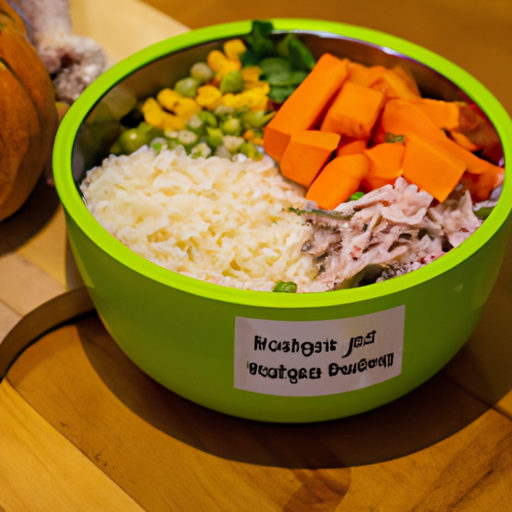As a responsible pet parent, you’re always looking for ways to give your furry friend the best possible care. This includes providing them with a balanced diet that meets their nutritional needs. In this guide, we’ll explore some additions you can make to your dog’s regular diet to enhance their health and wellbeing.
1. Raw or Steamed Vegetables
Your dog can greatly benefit from the vitamins and fiber in vegetables. However, not all vegetables are safe for dogs. Here are a few you can include in their diet:
- Carrots: Good for their teeth and packed with beta carotene.
- Green Beans: Low in calories and high in fiber.
- Sweet Potatoes: A great source of dietary fiber, vitamin B6, and vitamin C.
Remember to serve these vegetables in moderation and adequately processed (chopped, steamed, or pureed) to aid digestion.
2. Fruits
Fruits are a great addition to your dog’s diet. They’re rich in vitamins, fiber, and antioxidants. However, avoid fruits with seeds or pits as they can be harmful.
- Apples: High in fiber and vitamins A and C.
- Blueberries: Packed with antioxidants.
- Bananas: Rich in potassium and vitamins C and B6.
3. Cooked Lean Meats
Protein is a crucial part of your dog’s diet. Lean meats are a great source of this nutrient. Here are a few options:
| Meat | Benefits |
|---|---|
| Chicken | High in protein and can be easily digested. |
| Turkey | A great source of protein and nutrients like zinc and potassium. |
| Fish | Rich in omega-3 fatty acids, beneficial for skin and coat health. |
4. Healthy Grains
Whole grains can be an excellent source of fiber, aiding your dog’s digestion. Here are some grains to consider:
- Brown Rice: A source of magnesium, selenium, and vitamins B3, B1, and B6.
- Quinoa: A protein-rich food that also provides essential amino acids.
- Oats: High in fiber and packed with vitamins and minerals.
5. Dietary Supplements
Depending on your dog’s age, breed, or health condition, they may need dietary supplements. Always consult with your vet before adding these to your dog’s diet. Some common supplements include:
- Glucosamine: For joint health.
- Fish Oil: For skin and coat health.
- Probiotics: For digestive health.
Frequently Asked Questions
Q: Can I feed my dog only fruits and vegetables?
A: No. While fruits and vegetables are beneficial, your dog’s diet should be balanced with proteins, grains, and fats.
Q: How often should I add these to my dog’s food?
A: Moderation is key. Adding too much can cause stomach upset. Consult your vet for advice tailored to your dog’s needs.
Q: Can I replace my dog’s commercial diet with homemade food?
A: Only under the supervision of a vet or pet nutritionist. Commercial diets are formulated to meet all your dog’s nutritional needs. Homemade diets may lack certain nutrients if not properly balanced.
Remember, every dog is unique, and what works for one might not work for another. Always consult your vet before making any significant changes to your dog’s diet.



